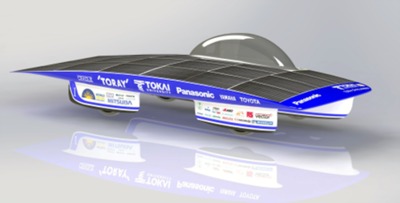Panasonic supports Tokai University in World Solar Challenge 2013
Friday, 30 August, 2013
Panasonic is providing its technological support to Japan’s Tokai University Solar Car Team, taking part in the 2013 World Solar Challenge (WSC 2013). To be held from 6-13 October, the biennial event is a time-based solar car race from Darwin to Adelaide - a distance of 3021 km. Teams come from all around the world, including universities and corporations, to compete in the race.
Steve Rust, managing director, Panasonic Australia, said, “I’m proud Panasonic is able to support Tokai University in its WSC bid. Globally, Panasonic is focused on a range of sustainable activities - from recycling to marketing a range of energy-efficient home appliances - and is developing further technologies and services that aim to reduce household CO2 emissions such as home energy management systems.”

The Tokai University Team won the WSC races held in 2009 and 2011, and is now looking to make a hat trick this year. Last year, the team also won the race in South Africa that was recognised by the Fédération Internationale de I’Automobile (FIA) as the world’s longest alternative fuel vehicle car race. Panasonic’s energy products contributed to the team’s victories at these events.
Panasonic’s HIT solar cells have a hybrid configuration with a crystalline silicon wafer substrate surrounded by ultrathin amorphous silicon layers. Compared to ordinary crystalline silicon solar cells, they suffer less degradation of power output at high temperatures, thus delivering a high energy output per unit of area.
The cells are therefore suitable for solar cars competing in races such as the WSC, given that the WSC regulations limit the total area of silicon-based solar cells installed on the body to up to 6 m2, and that the cells will be exposed to the scorching Australian sun. The HIT solar modules for the Tokai University team are purpose-built for the race, using the same solar cells - the main component that converts the sunlight into electricity - that are mass-produced for the residential market.
The rechargeable batteries provided by Panasonic are the cylindrical 18650 type (18 mm in diameter x 65 mm in height) lithium-ion battery cells, which use the company’s nickel-based positive electrode. The high-capacity and lightweight battery cells store excess power generated by the HIT solar cells so that the car is able to continue running even on overcast days.
Fluoride boosts water-processed perovskite solar cells
Queensland University of Technology has developed a water processing method to fabricate more...
Multibuild solar installation delivered at City of Playford
Trinasolar partnered with Venergy Solar to deliver a multibuild solar installation across the...
Oracle assists major distributor in clean energy transition
Essential Energy, an electricity distributor in Australia, is said to have modernised its...










